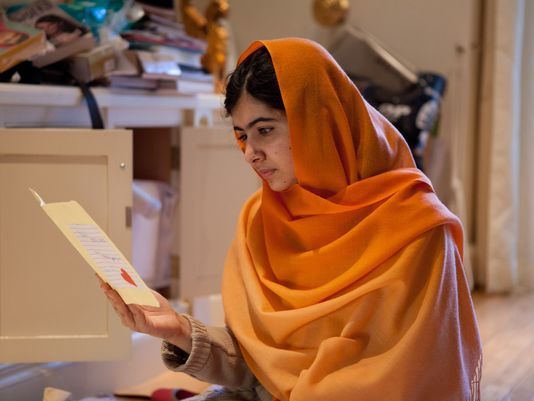Girls Education is a Human Right: The Cycle of Empowerment

By Melissa Mott
Human Rights Education Associate
Teaching high school English in Newark, New Jersey, our department began the school year with “The Seven Habits of Highly Effective Teens.” Struggling to make the unit interesting and applicable, I provided relevant examples of people who practiced good habits. From outlining study strategies, being assertive, and other healthy practices for success in school, the lessons were good…prescriptive, but good – until we got to education advocate and Nobel Peace Prize winner Malala.
Using her story to illustrate assertiveness – I showed the clip of a 15-year-old Yousafazi on The Daily Show explaining to Jon Stewart that if she were to meet a terrorist aiming to take away her right to go to school, she would “hit him with her shoe.” My students saw this moment as funny, humanizing, and essentially teenage, and they related to her immediately. Nearly 86% of my students received free and reduced lunch, and many had significant barriers to both attending and succeeding in school. They found a point of connection in her story and understood from first-hand experience Malala’s struggle to persevere beyond the limitations of society, in spite of trying circumstances outside of one’s control.
”
Her story helped them realize that they had a right to demand education. Their connection served as clarion call to fight circumstances beyond their control. Ultimately, they came to understand that by demanding education for themselves, they also were demanding it for their siblings, peers, family, and community, especially, when factors like systemic poverty, health issues, instability at home, or long and arduous travel to school threatened to undermine that right.
Equality of access to all levels of education is crucial to enabling women and girls to fully participate in the economic, social, and political life of their societies. Education unlocks a woman’s potential and is accompanied by improvements in health, nutrition, and wellbeing, not only for the individual woman, but also for her family.
Education is a cycle of empowerment, not a one-time occurrence. This cycle begins with understanding that education is a human right. Then, it requires leveraging one’s voice to demand that right. With education comes a cascade of understanding: how to liberate oneself from other forms of oppression, end cycles of violence and abuse, advocate for healthcare, and lift oneself from poverty. The final step in the cycle is inspiring others to understand these rights. This is the step my students in Newark most connected to – they were inspired by Malala’s story to help each other, and themselves.
Helping to create connections between girls is powerful because it reinforces the idea that with rights come responsibilities to a larger community, in maintaining those rights. This is the same mechanism for social change that sits at the core of a human rights framework. There is a responsibility to help others understand their basic human rights. The Universal Declaration of Human Rights not only recognizes that human beings are born free and equal in dignity and rights, but also that every person has “duties to the community in which alone the free and full development of his personality is possible.” International human rights law lays down a three-way set of criteria, whereby girls should have an equal right to education, equal rights in education, and equal rights promoted through education.
The first step in meeting these requirements is overcoming exclusion from schooling. In connecting with each other, they can understand their shared marginalization and the many ways in which their combined voices can transcend societal barriers.
Although the forces of exclusion may look different in Pakistan’s Swat Valley from those in Newark, New Jersey, girls are prevented from obtaining an education, all the same. But by creating connections with each other, they can create a cycle of empowerment to help themselves, and each other, find the intellectual, academic, and personal voices and strength that lead to lasting change.

